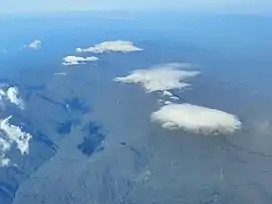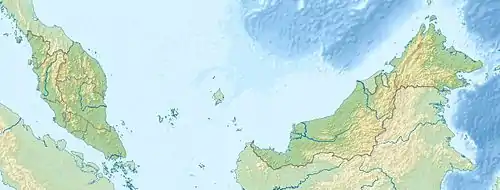Trusmadi Range
Trusmadi Range or Trus Madi (Malay: Banjaran Trusmadi) is a mountain range in Interior Division and parts of West Coast Division of Sabah, Malaysia that also separates the west and east coast of Sabah aside from the main Crocker Mountains. With a length of about 80 kilometres, the range includes the state's second highest peak, Mount Trusmadi, after which it is named.[1][2]
| Trusmadi Range | |
|---|---|
 Trusmadi Range with peaks of Trusmadi (furthest from view, enveloped by cloud), Kaingaran and Sinsing. | |
| Highest point | |
| Peak | Mount Trusmadi |
| Elevation | 2,580 m (8,460 ft) |
| Coordinates | 5°35′N 116°30′E |
| Naming | |
| Native name | Banjaran Trusmadi (Malay) |
| Geography | |
 Trusmadi Range Map showing location of Trusmadi Range within Malaysia. | |
| Country | |
| State | |
| Region | Interior Division, parts of West Coast Division |
| District | Tambunan, Keningau and Ranau |
Geology
Its geology comprises tertiary formation of mudstone, shale and argillite with subordinate beds of quartzite, sandstone, siltstone and limestone breccias.[1] The range physical characteristics strongly dissected into steep sided valleys and narrow-crested ridges where it is separated from the Crockers by the Tambunan-Keningau-Tenom plain.[3] It serves as a vital water catchment area for numerous water bodies such as the Kinabatangan, Labuk, Liwagu and Pegalan rivers. The largest catchment area is the headwaters of the Pegalan River with a number of tributaries including the Ambual, Kaingaran, Keinop, Linsudon, Mailo, Monsok, Sembuan, Sungei and Sook flow to the western direction into the South China Sea while the smallest catchment is irrigated by several tributaries of Liwagu River that flow into eastern direction towards the Sulu Sea.[2]
Biodiversity
With its higher elevation, the range hosts around 172 ferns species in 75 genera and 23 families.[2] Through a 2012 survey on the Trusmadi Forest Reserve where the range is located, a total of 36 mammal species, 144 birds' species including two species of reptiles and one species of butterfly were recorded.[3][4] It is the second most important area for Bornean endemics and montane species after Kinabalu for globally threatened birds like the mountain serpent-eagle Spilornis kinabaluensis and the near threatened Bornean frogmouth Batrachostomus mixtus.[3]
References
- Jumaat H. Adam (2001). "Changes in Forest Community Structures of Tropical Montane Rain Forest on the slope of Mt. Trus Madi in Sabah, Malaysia" (PDF). Journal of Tropical Forest Science. 13 (1): 78 [3/17]. Archived from the original (PDF) on 3 July 2019 – via Forest Research Institute Malaysia, Ministry of Water, Land and Natural Resources.
- Mohd. Aminur Faiz Suis; Florina Anthony; Maryani-Andi-Mustapeng Andi; Monica Suleiman (2016). "Additions to the Fern Flora of the Trus Madi Range, Sabah, Malaysia" (PDF). Transactions on Science and Technology. 3 (2): 313–318. ISSN 2289-8786. Archived from the original (PDF) on 4 July 2019.
- "Trus Madi Range [Data Zone MY022]". BirdLife International. 2003. Retrieved 4 July 2019.
{{cite journal}}: Cite journal requires|journal=(help) - "Site Conservation Context of Forest Management Unit (FMU 10)" (PDF). Sabah Forestry Department, Malaysia. p. 19. Archived from the original (PDF) on 3 July 2019.